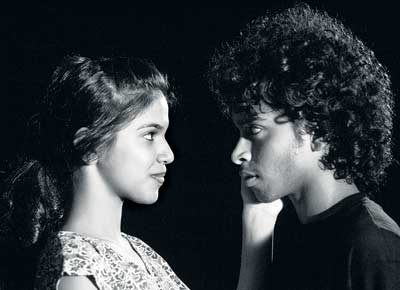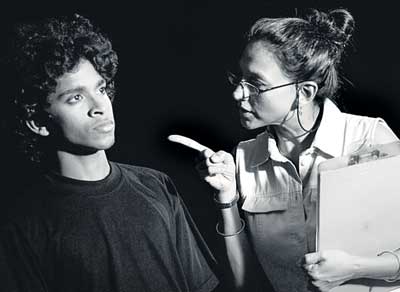
Beyond the realm of normalcy
Equus is the extraordinary story of Alan Strang – the young boy who in one terrible night blinds six horses with a spike. Why did he do it? The whispers have begun, stained by bafflement and revulsion, even as they take him away from the stables and the horror of what lies within. So when Hesther Salomon, the local magistrate, decides that Alan needs counselling and not a jail sentence, there seems to be only one man she can turn to – Dr. Martin Dysart, psychiatrist. But for Dysart, Alan will be a revelation, one that will force him to look inwards, inwards wherein lurks the good doctor's own undoing. More than 30 years after it was written, Equus is still a taut, tense, masterpiece, riddled with controversial opinions and difficult issues. "The whole term psycho-drama probably came around with this play," says Tracy Holsinger, who plays Alan's mother, Dora Strang. It only adds to the tension that this is a play, at least at its heart, based on a real incident which playwright Peter Shaffer encountered in passing. Shaffer knew very little, only what a friend had mentioned casually. The little he did know – that some boy had blinded six horses in a stable – were enough to drive his creation of "a mental world in which the deed could be made comprehensible." Shaffer's world, his recreation of the crime, is exactingly constructed, built around the memories of Alan (Hiran Abeyesekera) and his parents, Dora and Frank (Shanaka Amarasinghe). It also stretches to include several others – Jill Mason (Subha Wijesiriwardene), Harry Dalton (Dominic Kellar) and the horse Nugget (Shannon Raymond) are integral parts of Alan's recollections and Dysart's attempts to unravel the boy's motivations. Rohan Ponniah who plays Dysart has, quite literally, had time to grow into his challenging role. As the only remaining member of the original, staggeringly popular 1978 production, Rohan continues to find playing Dysart both rich and daunting. Much of the play's appeal, both for actor and audience, lies in Shaffer's accomplished handling of a theme and substance that Rohan labels "universal." "Universal not only in the sense of different nationalities, but also in terms of time, because he's talking about the type of traumas and questions that we have faced, not only in my generation, but in my parents' generation. It's about life, and in that sense life hasn't changed that much..."
Life may not have changed that much, and neither have the nitty-gritty of the production itself. Under the direction of Steve de la Zilwa, this production will stay true to the one staged by Shaffer in collaboration with John Dexter in the role of director, and John Napier as designer, Steve explains. Together the three men created what Steve describes as "a contemporary classic." Marked by its minimalist, yet highly evocative stage design, cinematic style, and its emphasis on ensemble playing, the script can sometimes be almost "ridiculously innovative," says Steve, who laughingly confesses to having kept his own modifications to the bare minimum. "It works because the script is so powerful and the characters are so well-defined," says Rohan, and it's true that every character that you meet in Equus will challenge you or at the very least, provoke you to think. Even the horses – silent, looming large in the darkness – have a great deal of presence. With intricate masks of wire that do nothing to hide the actor's faces, and heavy, raised hooves, these are horses of the mind – strongly suggested, heavily symbolic. And at the heart of it all is Alan Strang. The brilliance of Shaffer's expression brings him alive. A restless, seeking son of neurotic, conventional parents, Alan has something that even Dysart envies – passion. It is a passion that strains the bounds of the normal, that defies conventional ideas of spirituality, and that challenges everyone who sees it to find their own. Presented by the British Council and The Joint Effort Company, Equus is directed Steve de la Zilwa. The play will run from October 18 to 21, and 26 to the 28, at the British School Auditorium from 7:30 pm onwards. The play is aimed at mature audiences, and is not for children. Tickets are available at The Wrap Factory, 75A Kynsey Road, Borella and at the British Council and are priced at Rs.1000, 750 and 500. Sponsors for the event are Coca-Cola Light, Yamaha, Singer Mega, CASA Colombo, The Bay Leaf and The Commons. Media sponsors are Yes Fm, MTV Channel 1, Hi!!, The Daily Mirror and The Sunday Times. |
|| Front
Page | News | Editorial | Columns | Sports | Plus | Financial
Times | International | Mirror | TV
Times | Funday
Times || |
| |
Reproduction of articles permitted when used without any alterations to contents and the source. |
© Copyright
2007 | Wijeya
Newspapers Ltd.Colombo. Sri Lanka. All Rights Reserved. |

